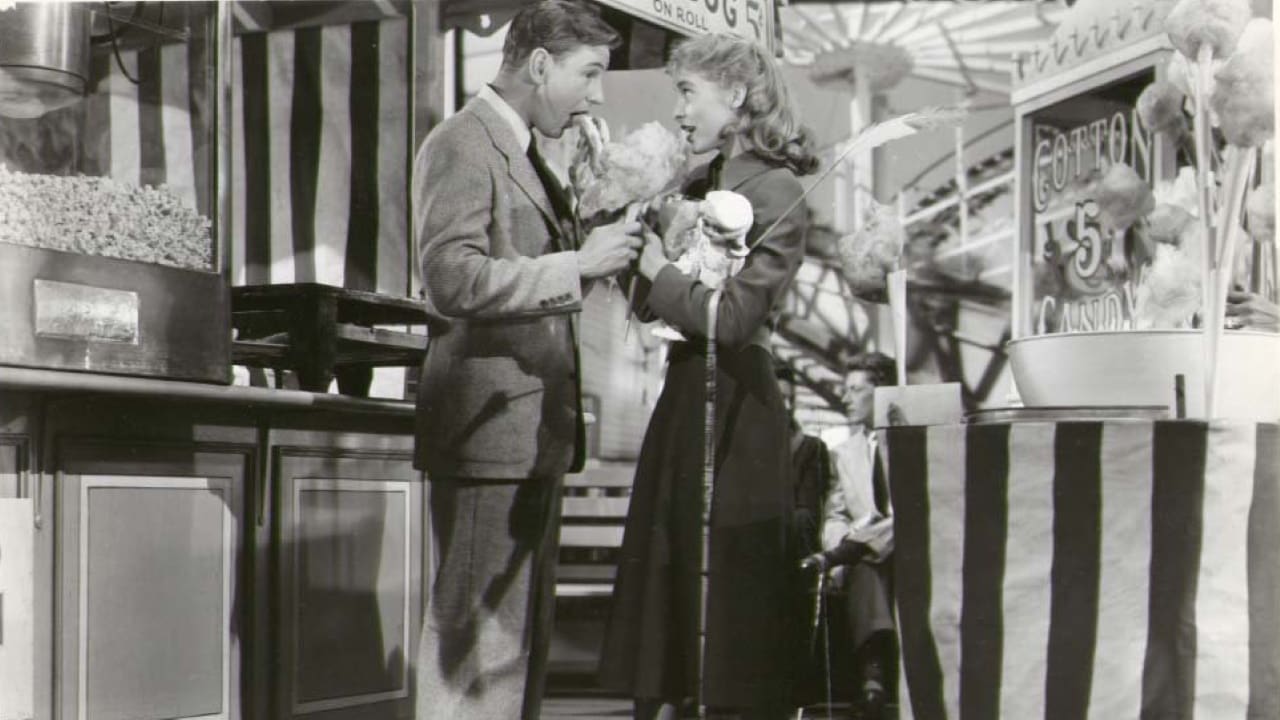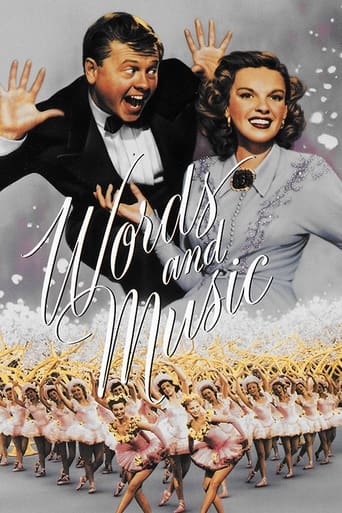

One of the worst movies I've ever seen
... View MoreExcellent but underrated film
... View MoreAbsolutely amazing
... View MoreWorth seeing just to witness how winsome it is.
... View MoreWords and Music is one of those films that is heavily flawed but is still a pleasure to watch. The failures are mainly to do with the biographical parts, with anachronistic and rather stilted dialogue, an underwritten and stodgily paced story that takes truth liberties to the extent that Richard Rodgers and Lorenz Hart just don't seem very interesting and the heavier dramatic elements seemed on the ham-fisted side. Unfortunately there are also casting issues too. Tom Drake is so restrained as Rodgers that he comes across as colourless, especially when compared to Mickey Rooney who chews the scenery to pieces with the subtlety of a sledgehammer that seems at odds with the rest of the film. Janet Leigh also has very little to do and her performance doesn't register as a result. The film has lovely sets and costumes though and the cinematography is very nicely done. The music is top drawer with witty lyrics and melodies that are both beautiful and catchy. The choreography brims with sharpness and nostalgia too, and several of the performers are great. Of the musical numbers, my personal highlight was Slaughter on 10th Avenue, utter class of the highest order and danced to perfection by Gene Kelly and Vera-Ellen. Very close is Thou Swell, June Allyson performs it with such lively energy, and you have to love the Blackburn Twins' coyness. Blue Room benefits from Perry Como's sensitive singing and Cyd Charise is able to show her elegant dancing and long legs just as beautifully. Mel Torme's rendition of Blue Moon is incredibly touching, as is Judy Garland and Rooney's(his best moment in the film easily) reunion rendition of I Wish I Were in Love Again. Garland's Johnny One-Note charms too and Lena Horne's The Lady is a Tramp is a winner. All in all, the biographical elements don't really work but the musical numbers do and the best ones(Slaughter on 10th Avenue and Thou Swell) are outstanding. 6.5/10 Bethany Cox
... View MoreI enjoyed the hell out of this picture. Mickey Rooney should have been nominated, one of the best things he ever did. He has enormous energy, presence, more talent than should be legal and is riveting on the screen.Most all of the reviews of this picture conclude that they hate it. Why? It's not an accurate portrayal of Hart's life. SO WHAT! You want facts, read the biography.It is a fully enjoyable musical with wonderful songs and dances by some of the most talented people of the last 100 years. They don't write songs like this anymore, they don't have talent like this anymore. Mickey Rooney was terrific, Gene Kelly was athelitic and wonderful, June Allyson was cute and adorable, this entire picture is just a fine example of the Musical Art I think many of those who dislike this picture need to lighten up and enjoy the Words and the Music! Life's to short for the petty objections related in most of the other reviews.
... View MoreFor years, I read again and again that this movie would disappoint me, that it was a waste of talent, that it was badly fictionalized, et cetera. What a load of hooey! The dialog is crisp and rings true, the musical numbers are full to the brim with pep and style, and the performances are nothing short of masterful! If you like music, Broadway, and old-fashioned musical brilliance, then this is the movie for you. I hate to sound like an advertisement, but you'll laugh, you'll cry, you'll sing along, you'll dance in your seat! This is movie is not to be mistaken for a masterpiece, despite all of this. It is a very standard musical for the period and for the MGM style -- but that's the best!
... View MoreLike most biographies of musicians or lyricists WORDS AND MUSIC is great as a showcase of the music, but a bent synopsis of the life story. It's of a piece with films as diverse as A SONG TO REMEMBER about Chopin, YANKEE DOODLE DANDY about Cohan, NIGHT AND DAY about Cole Porter, or STARS AND STRIPES FOREVER about Sousa. Except for elements about Chopin's patriotism to his native Poland and his affair with George Sand (which was twisted unfairly against Sand) A SONG TO REMEMBER was the most successful film of this bunch in chronicling a composer's career and showing some type of tension ridden story line. YANKEE DOODLE DANDY was (due to the upbeat nature of Cohan's stage career) the best of these films, but hid everything negative about the man. The Cole Porter film NIGHT AND DAY did capture the problems of Porter's physical catastrophe (the riding accident that crippled him), but it left him a total heterosexual. It was not until the more recent movie with Kevin Kline that his homosexuality was brought out.It was a distinct negative for YANKEE DOODLE DANDY that Cohan was still alive, and vetoed any information about his first wife Ethel Leavy, and his campaign against Actor's Equity. Cole Porter was similarly alive when NIGHT AND DAY came out, but the studio would never (in the late 1940s) discuss homosexuality. Otherwise, we know Porter loved the film - he said he could not complain about a movie where he was portrayed by Cary Grant!With WORDS AND MUSIC, concentrating as it did on Lorenz Hart (safely dead in 1948) it made nonsense about that lyricists personal demons. As mentioned on another review, Hart was fully as gay as Porter or Tschaikovsky were. For most of his life he was unhappy about this and sought a woman he could love who would make him a heterosexual. As has been pointed out, Vivienne Segall was the Broadway star he approached on several occasions to marry, and he never could get her to say yes (probably a wise move by Vivienne). Unfortunately, her last rejection was during the revival of A CONNECTICUT YANKEE in 1943, and it played a role in undermining his spirits.The film shows June Alysson doing the "Thou Swell" number from YANKEE's original production in 1930. For the revival, Hart wrote the lyrics for his last masterly piece - Morgan Le Fay's "To Keep My Love Alive", which Ms Segall sang on opening night. Ironically, Hart died before the opening night of the revival. Broadway people in the know were aware that Vivienne may have turned down Larry, but that she came as close to loving him as was possible for a woman. When she finished her number, there was a standing ovation for her - and for the man who was not quite the man of her dreams.This film is full of good moments, from Alysson in the above number, and Perry Como doing "Mountain Greenery" and Rooney and Garland in their last duet on film. It does not touch upon the struggles of Hart and Rodgers in getting Hollywood to take their work seriously. Fortunately their skillful use of "song - dialog" appears in several of the Paramount films of the early 1930s, most notably in the great LOVE ME TONIGHT and HALLELUJAH, I'M A BUM. There use of ballet (with George Ballanchine) in ON YOUR TOES on Broadway is not noted, nor is their pushing one of the best first book musicals: PAL JOEY. One can go on like this about what is not properly shown. It was not until a few years later that a solid dual biography about collaborators in musical theater, THE GREAT GILBERT AND SULLIVAN, turned up with Robert Morley and Maurice Evans. But in that case, both central characters were safely dead, and their personal quarrels were so well known to make a real story line, punctuated by segments from their operettas. Even so, this was not enough to change Hollywood technique - the next big musical biography was THE STARS AND STRIPES FOREVER with Clifton Webb, a good film but barely with any details of the subject's life and non-musical achievements.As was mentioned on this thread in another review, Larry Hart's final, fatal binge (reminiscent of the father's death in A TREE GROWS IN BROOKLYN, by the way) was done after his attending the first night's performance of OKLAHOMA. Hart probably saw the handwriting on the wall: a new lyricist named Oscar was on the horizon to take his place - a good family man or impeccable theatrical background and success, and not a drinker! But there is another element to it. The split between Hart and Rodgers had been growing for awhile, and Rodgers (per forma) had offered the job of lyricist in OKLAHOMA to Hart. Hart did not like the book, and begged out. He actually was approached by another composer to do the lyrics for an operetta. It was Emmerich Kalman, best known for the operetta COUNTESS MARITZA. Hart was still thinking about this offer (he had done lyrics for the movie version of THE MERRY WIDOW for MGM in 1934). Whether he and Kalman might have been as successful as Rodgers and Hammerstein were is a curious question to ponder.
... View More